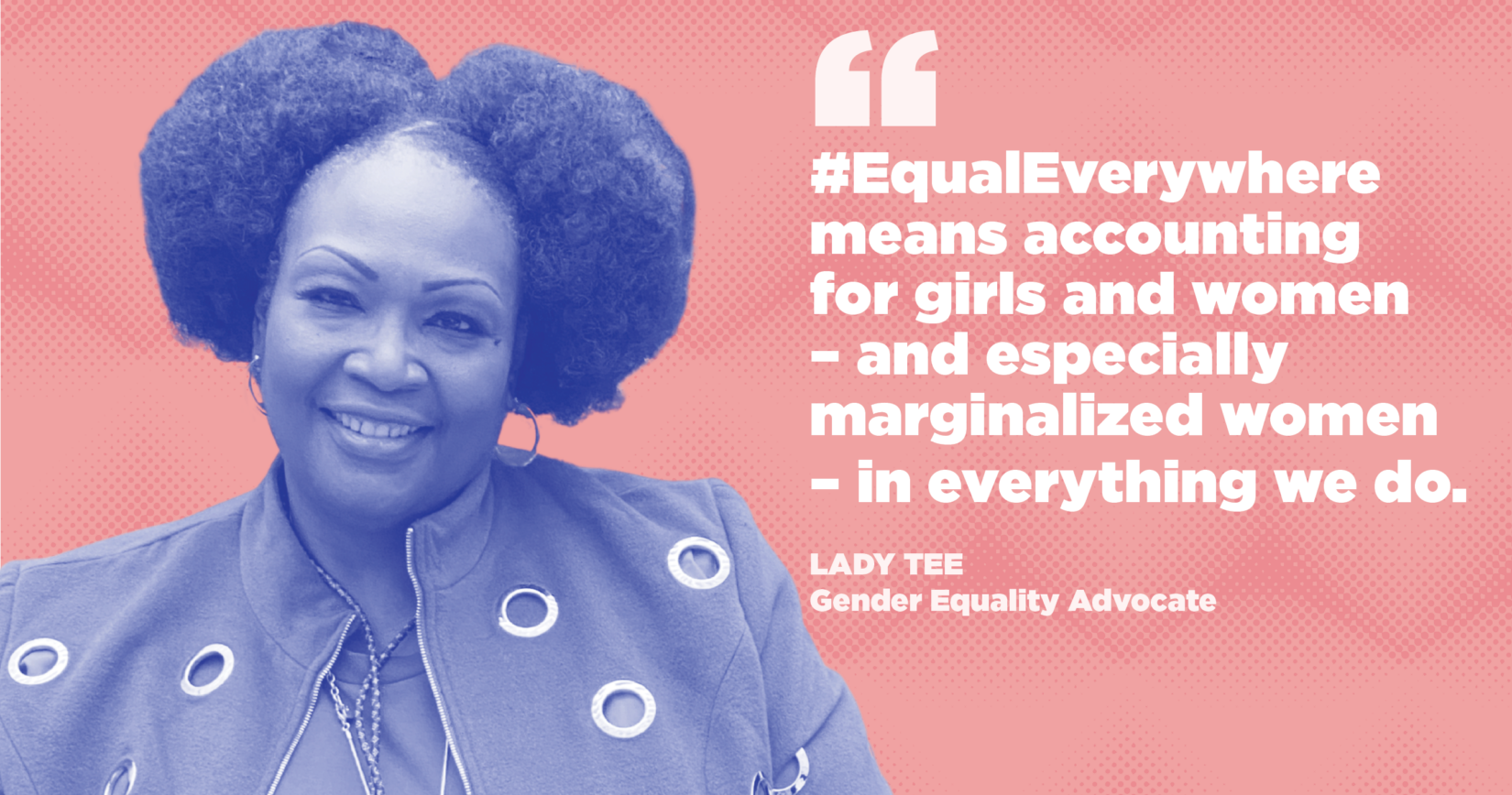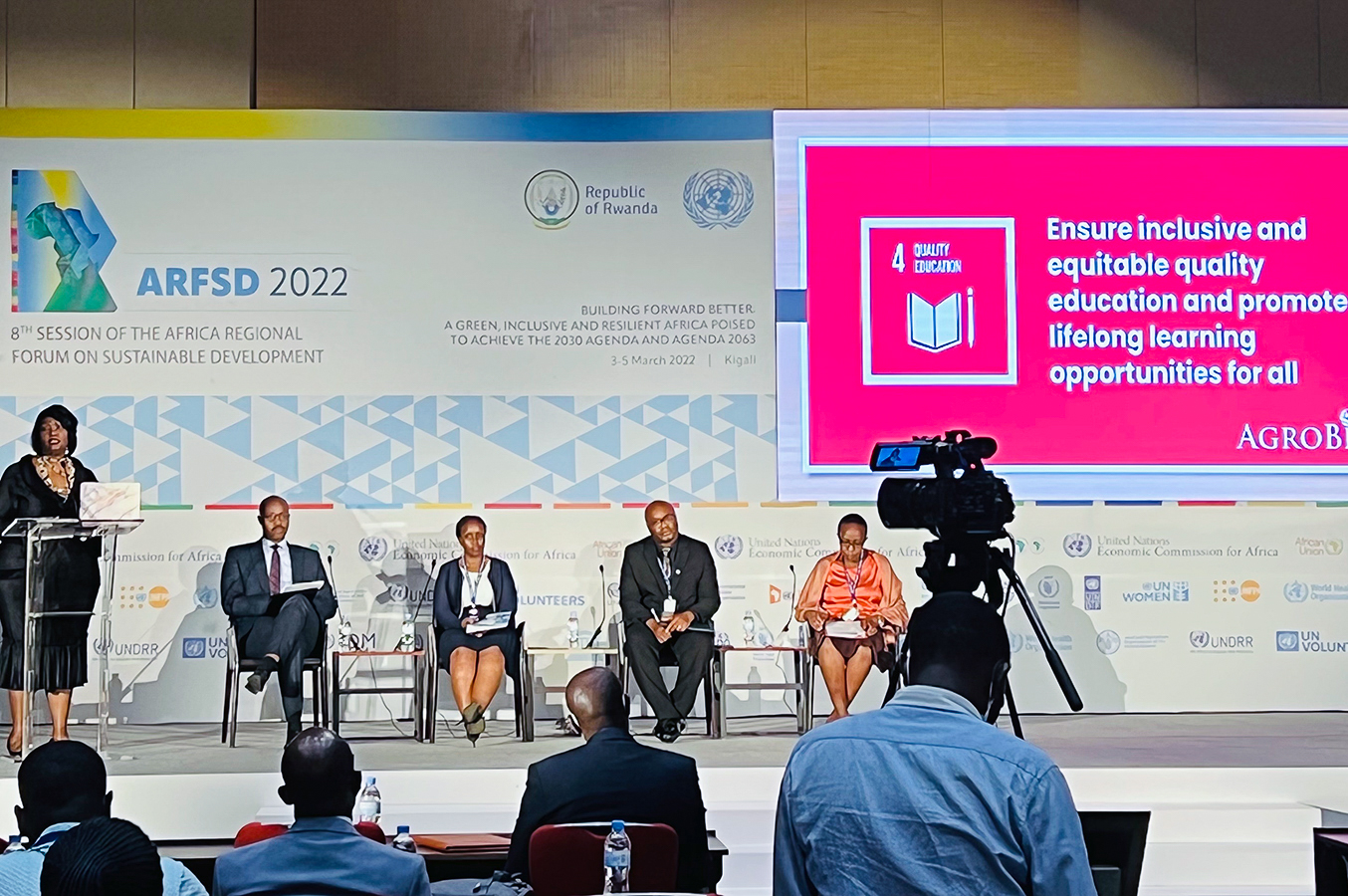If Lady Tee’s story inspired you, join the movement for gender equality—and share your commitment to making girls and women #EqualEverywhere.

Lady Tee Thompson knows that when it comes to securing equal rights and opportunities for everyone — regardless of their gender, race, physical abilities, or socioeconomic status — progress does not come easy.
She’s worked with public institutions in her home state of Michigan to protect access to education for women and marginalized students. And she’s taken on some of the most entrenched societal failures, from food insecurity to lack of economic opportunity, that are holding girls and women back around the world.
She shares how her experiences as a disabled, marginalized, and minority woman entrepreneur have shaped and inspired her lifelong efforts to ensure women of all backgrounds have access to education and opportunity.
What first motivated you to become an advocate for girls and women?
My first experience with advocacy was in 1989, when I was the student government president at Highland Park Community College. At the time it was the only HBCU (historically Black colleges and universities) in Michigan, and women made up a majority of the student body. Highland Park was a vital institution of higher education, offering underserved communities in the Detroit area opportunities to further their education and build careers, especially in the medical field; it was home to a top-graduating nursing program.
Unfortunately, the school was experiencing financial and administrative challenges, and by the time I was serving on student government, Highland Park was on the brink of closure. So I worked directly with the Michigan Board of Education to keep the school open for as long as possible.
It was intimidating to speak before a big institution like the Board of Education as a young student, but I was determined to keep the school open. If Highland Park had shut its doors then, the most marginalized students — those who were low income or homeless, physically disabled, or lacked access to technology at home — would have been the most severely affected.
In the end, I managed to help keep Michigan’s top-graduating two-year HBCU open for several more years. Sadly, the school ultimately closed, but I am proud that I was able to help more women and marginalized students change their socioeconomic trajectories in those final years.
Being the voice of my community — representing Highland Park Community College — before a massive institution was a turning point for me. I realized that I could have a seat at the proverbial table. From that point on, I realized that I could help make a difference for those who were most at risk of being left behind. My passion for advancing equality — especially gender equality — grew from there.
And just as important, it helped me to see that making a real difference means overcoming more than one obstacle. It takes persistence to knock down barrier after barrier to progress. Achieving a gender-equal world means repealing discriminatory laws and practices, educating, protecting, and promoting the rights of girls and women at every turn.
“Achieving a gender-equal world means repealing discriminatory laws and practices, educating, protecting, and promoting the rights of girls and women at every turn.”
-Lady Tee Thompson
How did you find the courage and the confidence to represent students before the state’s Board of Education?
I had a fantastic mentor: Congressman John Conyers Jr. He served in the U.S. House of Representatives for over half a century and remains the longest-serving African American member of the House. He taught me how to effectively advocate against a huge institution like the Michigan Board of Education, and he personally taught me about equality, equity, and inclusion.
As a champion for justice and equality himself, Congressman Conyers helped me understand that we all have a civic duty to eliminate discrimination, even — and especially — if that means going up against institutions or harmful norms in our societies. That is how progress happens for all of us. That is how we can ensure equality for everyone, everywhere.
That’s a valuable perspective, especially since progress on gender equality has been slow, stagnant, and set back by recent crises. Where have you found progress since your time at Highland Park?
Over the past two decades, I’ve shifted from local to global advocacy with a focus on supporting women entrepreneurs around the world.
I had a pivotal moment in 2015 after speaking at a women’s empowerment conference in West Africa. Several of the women I met were leading farming cooperatives and shared that they not only lacked land rights, but they couldn’t receive the training they needed to scale up their businesses — just because they were women.
Ninety days later, I launched an agricultural and entrepreneur training firm: AgroBiz.org. To date, we have mentored over 50,000 girls and women across the U.S. and 14 other countries. Our support takes a variety of forms, from bringing women farmers from Africa to the U.S. for learning tours to educational programming on everything from precision agriculture to launching and growing microenterprises.
Economic empowerment and food security are two sides of the same coin, and both are essential to gender equality. In fact, according to the Food and Agriculture Organization, the number of hungry people in the world could fall by as much as 150 million if women farmers were guaranteed access to the same resources as men.
How has your engagement with the United Nations Association of the USA (UNA-USA) contributed to your gender advocacy efforts?
Joining UNA-USA was a natural fit. As the current co-Chair of the Women’s Affinity Group, I’m empowered to directly discuss and challenge systemic gender inequalities and inequities. And as a Global Goals Ambassador, I’ve been able to continue advocating for the Sustainable Development Goals (SDGs) in new ways and places.

For example, I traveled to Kwara State in Nigeria in early 2023 where I visited a local company run by KAM Holdings that manufactures steel nails. The best part? It’s an all-women workforce, and their manufacturing process produces zero steel waste. It’s a great example of how progress on one SDG unlocks progress across the entire framework, in this case, from Gender Equality (SDG 5) to Decent Work and Economic Growth (SDG 8) to Sustainable Consumption and Production (SDG 12). Seeing how innovative they were in order to ensure zero steel manufacturing waste and align their work with the SDGs was encouraging. But it was their dedication to the economic empowerment of women in their community that rejuvenated my soul and reaffirmed my faith that equality everywhere is possible.
What does #EqualEverywhere mean to you?
It means bringing a global, gender-specific lens to our laws, cultural norms, homes, workplaces, and communities. It means accounting for girls and women — and especially marginalized women — in everything we do, and everywhere we do it. It’s the only way we can build truly inclusive communities and societies. And we’ll be able to do it only if everyone is an advocate for gender equality.
 BACK TO STORIES
BACK TO STORIES